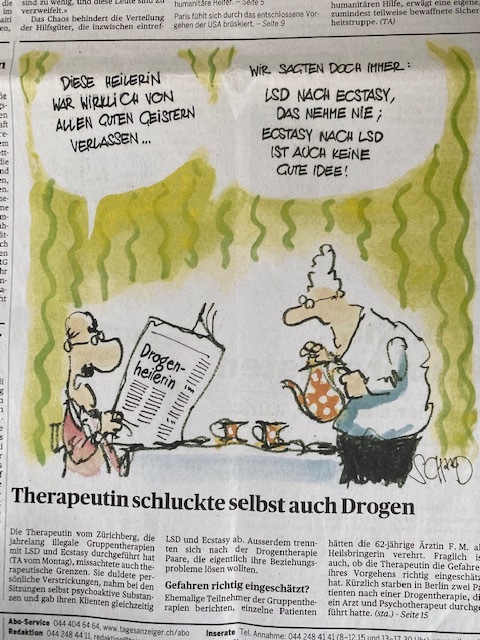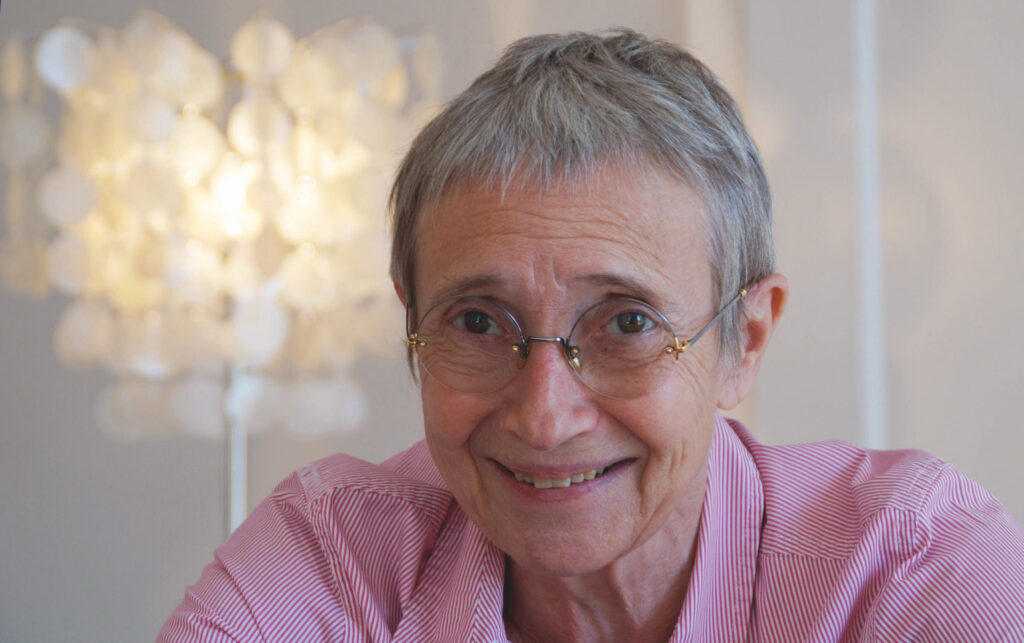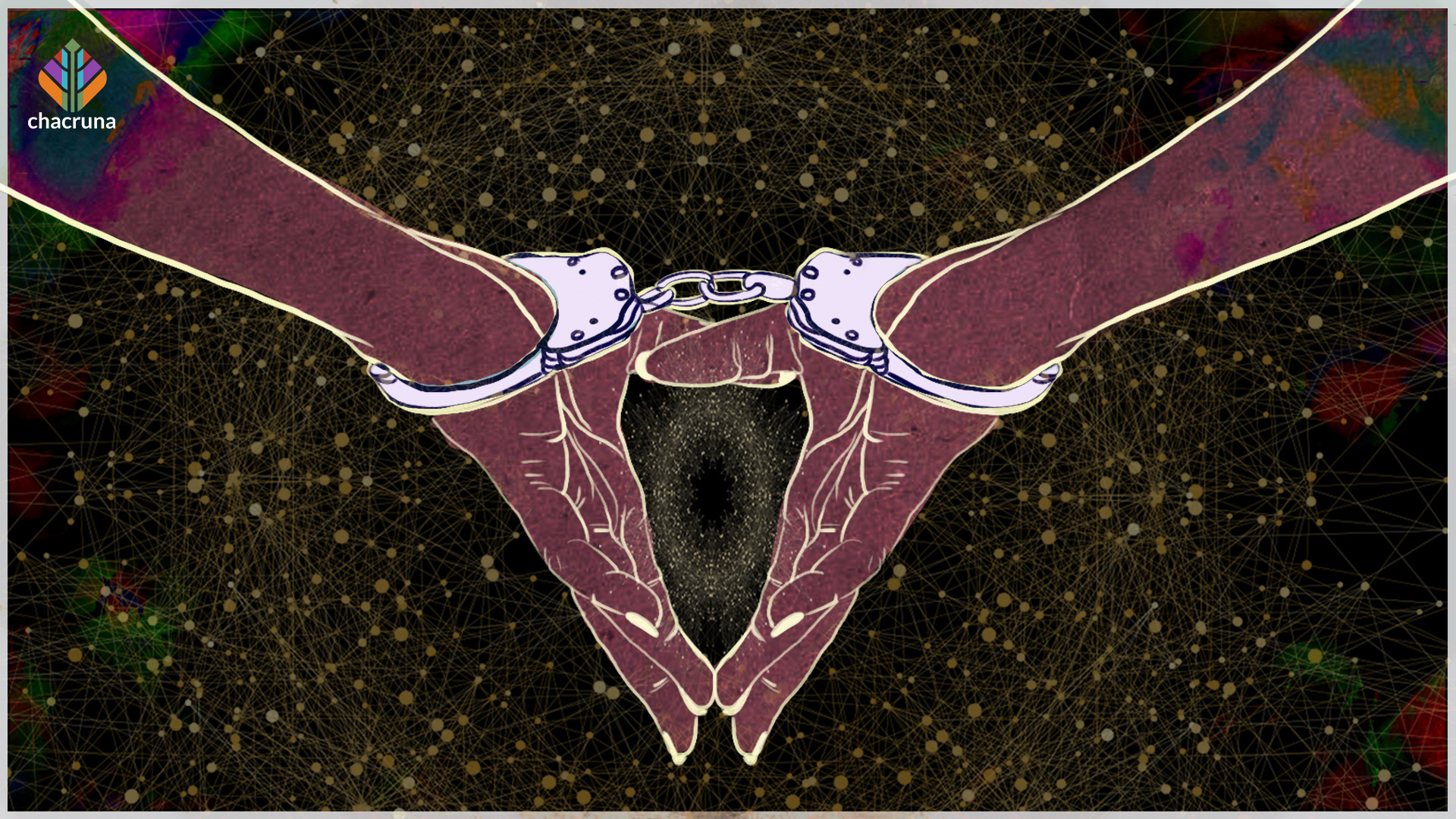- Educating Gringos in Shipibo Ways - December 13, 2021
- LSD in the House, Cops at the Door: A Psycholytic Therapist Reflects on Her Darkest Moment - July 28, 2021
- Peer support line helped 16 “bad trippers” avoid the emergency room - June 4, 2021

In 1988, the Swiss federal health department licensed seven psychiatrists to work with MDMA and LSD. One of the psychiatrists offered to train other providers. Dr. Friederike Meckel, an MD and psychotherapist, began training with them in 1992. The license was withdrawn in 1993, and psychedelics were banned in all contexts in Switzerland. But Dr. Meckel continued to train with the psychiatrist until 1995. Around 1997, Friederike started doing psychedelic sessions on her own.
We interviewed her by video from Switzerland.
CHACRUNA: Let’s start with a bang. October 29, 2009. 6:30 in the morning.
FRIEDERIKE: I was actually still sleeping. The banging at the door, I just incorporated this into my dream.
You thought you were dreaming?
I got up with earplugs in, without glasses. I was in my undershirt and panties. My husband said, the police are here. And I opened my eyes, and I saw about 10 men standing on the stairs. I could feel my heart two meters in front of me, beating like hell, and there was a tsunami in my head. Then I was totally calm. Dissociated.
When the newspapers found out about the arrest, they said you were running a drug cult.
That’s right.

Were you running a drug cult?
No, we were a group, and we met regularly, and sure, since it was underground, everything just stayed within this group.
What else did the press say about the group?
Because I had done body work, they naturally thought immediately of sex. They called it a sex and drug sect.
What were you doing?
I was doing psycholytic therapy [psych meaning “mind/spirit” and lytic meaning “dissolving/loosening; the therapy involves taking low doses of psychedelics repeatedly as a way to open the individual to the therapeutic process] in my very own setting that I had developed over the years. I had learned body work with Stan Grof. If there is someone who lacked bonding, I would hold him if he needed that.
In groups of 12 to 16, you were giving people 120 milligrams of MDMA, usually, and 50 milligrams of LSD.
It varied. But, typically, yes.
Basically, you had a couple in the group, and the man left the wife, and the wife got mad and told the police about the group. Then the police surveilled you for a year.
Yes.
You thought you wouldn’t be caught?
No, I didn’t think that. In the very beginning I was afraid and I did a session for myself. And I confronted myself with the fear. I was trembling all over the place. And then I sort of had an insight that if I would be very authentic and very thoughtful and I am very precise [about what I was doing], I would be protected.
What do you mean protected?
Protected by, by, (waves hands toward the sky), by my spirits. I had become in my heart a true medical doctor.
Do you think the spirits didn’t protect you?
No, I mean, I did the job for 10 years. When this happened, I had not carefully checked out what was going on with this couple.
So you don’t blame the spirits. You blame not doing your homework.
Yes. I should have looked more into it, what fights they had.
Friederike spent 13 days in jail. After her trial in July 2010, she was ultimately convicted of the possession and trafficking of LSD. She was not convicted of other charges because she had worked in a controlled setting and had not harmed anyone. She was given a two-year suspended sentence of 16 months in prison. Nevertheless, while she didn’t spend any more time in jail, she says she felt traumatized by her experience with the justice system.
On the other hand, she gradually came to see getting caught as a blessing. Because she was caught, she’s one of the few underground therapists who have been able to openly tell their stories. Soon after her ordeal, Friederike connected with drug policy expert David Nutt, who linked her with Dr Ben Sessa, a British psychedelic researcher, and together they published a paper in 2015 in the journal Drug Science, Politics and Law. The same year, she published a book about her approach Therapy with Substance: Psycholytic Psychotherapy in the Twenty-First Century. She says that writing helped her share with many more people what she learned from her time as an underground psychedelic guide.

Recordings are now available to watch here.
What advice do you have for people who are doing similar work who want to avoid your run in with the law?
Several things. What I did well: I always kept in contact with those who did research, so I got a lot of knowledge. I met some people from the Schweizerischen Ärztegesellschaft für Psycholytische Therapie [Swiss Medical Association for Psycholytic Therapy]. I asked them a lot of questions: “What are the indications and contraindications?”, “What are the effects of taking MDMA and SSRIs?”, and so on. In the beginning, the late 90s, one didn’t know anything. So I asked my clients about their illnesses, their blood pressure. If they were over 50 they had to go to the cardiologists to have an EKG on the bike.
I always had at least one doctor in the group. I always had emergency medication in the house. I could have started an emergency saline IV, we also had valium in case talking them down and waiting would not be successful—which never happened. I also was able to ventilate with a bag, in the possibility someone collapsed and stopped breathing. If their blood sugar would drop, we always had dextrose drinks and fruit. This was the basic emergency kit.
What else I did well: I was very careful with the dosage, so that each person could reflect on themselves during their experience.
We always started on Friday evening with a very long round of setting intentions. All participants stayed in our house over the whole weekend. Afterwards, I kept close, close contact with them. They would come for regular talk therapy sessions before and after their psycholytic sessions. They had to write a protocol [which summarised the experience in the last session and which was the “entry ticket” for the new one], so that I could see whether they did their homework.
I was all about carefulness and being accurate. Very disciplined. My ancestors are from Prussia. With the very ritualized way of doing the whole thing, you get calmness and certainty, the participants feel safe. I did it wholeheartedly. I was always there.
“I was all about carefulness and being accurate. Very disciplined. My ancestors are from Prussia. With the very ritualized way of doing the whole thing, you get calmness and certainty, the participants feel safe.”
Friederike Meckel
And what are some of the dangers?
There were times when I didn’t recognize a personality disorder, like narcissism, bipolar, or borderline personality disorder. You only find out that they are this way when they are in stress. The narcissists are nice to have; they are very funny, they contribute, and they take a lot of space. But they don’t have the capacity to really have insights and change. I would never take on a person with a psychiatric history of psychosis.
It would be wonderful to have an underground association, where [practitioners] could at least have a platform to talk.
In Denver, we have a psychedelic professionals meet up every month.
Underground people can come there?
Of course, they don’t say they’re underground, just that they’re interested in talking about psychedelics in a theoretical way that’s interesting and helpful.
***

Let’s talk about growing up in Germany. You were born there right after the war.
Yes, this was actually the reason I got into needing the help of psychedelics.
My father went to war. He was wounded in the battle of Kesselschlacht bei Smolensk. He walked from Smolensk in Russia back to Berlin, and there he was operated on a couple of times and his leg was taken off. A nurse—because he was young, bright, and good looking—gave him lots and lots of morphine. So, when he got out, he was dependent on morphine.
I was born in 1947 in Erlangen, which is in the southwest of Germany. When I was three, I remember the ruins and the dirt and the holes in the wall and we were horribly poor. And it was normal.
Do you think your dad agreed with Nazi principles?
No. He didn’t. He was not a Nazi. He was too young for that. My father was born in 1923, so he was 18 years old (in 1941, when he was injured). I think he had a very severe post-traumatic stress disorder because he was moody and dependent on morphine. We had this typical post-war family disaster. And my father passed away when I was only five.
How did he die?
It was said he committed suicide.
You don’t think so?
He had obviously had a fight, was pushed over and fell, broke his neck and then they hanged him up. So that it would look like a suicide.
Why do you think someone wanted to kill him?
He had debts because of the morphine. Because when the war was over, wounded people wouldn’t get morphine supplied anymore.
It seems you had a lot of things to work on with psychedelic therapy.
I was 46 and then I started to investigate myself [with psychedelics]. When I had my first psycholytic experience, I knew immediately: “Now I find myself.”
And how are you now?
I feel good. Now I know who I am. I have really accepted my past and I thank God for all these insights. In this way I can understand post-traumatic stress disorder. I know how it feels to be dissociated. I know all the triggers. I have worked through hell. Really hell.
Yet, I would not change my past.
You wouldn’t change your past? You would have your dad die at five and be born into a war-ravaged country that the world hated?
It gave me the chance to evolve. So that’s advice I would give any underground therapist: work through your own stuff.
So, I assume you have forgiven the woman who betrayed you.
Forgive is a difficult word. I have tried to creep into her head, and from her point of view, she’s right.
She was right to go to the cops?
She was so hurt that her husband had left her, she couldn’t deal with this anger. We are both women. We are humans.
***
Discover the Indigenous Reciprocity Initiative of the Americas
The newspapers really took you to task back then. I live in this liberal bubble in Colorado where psychedelic psychotherapy is often seen as a wonderful thing to solve all these problems. But back 12 years ago it was seen as a dangerous, damaging, underground, filthy, corrupting thing. We’ve come a long way into 12 years.
Yes, but I have my doubts about now. The marketing now is really already starting to be competitive. Centers all promise healing and people think they’ll take the substance and then they have the big revelation and be healed.
So we’re setting up a lot of people for disappointment?
Exactly. I think there are things to be done first. What does it mean to be healthy? And what does it mean to be healed?
Compass Pathways is worth some 1.3 billion dollars. Do you think it’s overvalued?
Yes. With so-called teacher plants, ayahuasca, and mushrooms, one has to learn to relate to these plants and to talk with them, to submit and to understand what the plant is telling you, to ask the right question, to have a true intention. And then really surrender to the substance. I think they dishonor these substances. If the individual really says, “I want to know the reason behind my depression,” then the mushroom will show them. And then they have to work. Don’t expect to see the problem and be healed. So I’d ask, the people who administer and who lead these wellness centers, what is their motivation? Just wanting to help is dangerous.
“I’d ask, the people who administer and who lead these wellness centers, what is their motivation? Just wanting to help is dangerous.”
Friederike Meckel
Wanting to help is dangerous? How so?
Then you have an Own Need.
You mean, an “own need” is, “In order to keep our shareholders happy and our clinics running, we have to deliver depression relief in a six hour window for $1,000.”
We learn this in psychotherapy, the first lesson. Don’t want to help.
But you’re the doctor. Shouldn’t you want to help people because as a doctor you know how?
No, on psychedelics it’s different. The therapist’s ego is a very dangerous thing. You think you can help, but you can’t. No, no one knows better than the client himself.
“Who is going to guarantee that these processes are ethical, educated, and well conducted? It frightens me. These companies have to know what it means to really work with a depressive or an addictive person.”
Friederike Meckel
Who is going to guarantee that these processes are ethical, educated, and well conducted? It frightens me. These companies have to know what it means to really work with a depressive or an addictive person. You have to see the person for, let’s say, a year on a regular basis, and then you work with her with psychedelics—with someone who has real skills—and you continue working in therapy, have a breathwork session, or a family constellation session, and so on.
I would be very happy if these substances are made available and there were teachers to teach people how to be with these substances and guide them through their sessions—and I mean relatively healthy and normal people—to help widen their senses, get a new perspective on the world. And this would really help society.
So we’d be better off trying to get healthier people into psychedelics psychotherapy as opposed to depressed people?
Exactly. I think this would be a really good project to widen people’s perspectives on the world, to be more careful with nature.
Is there any group doing it right?
Well, I’m now engaged at Synthesis, a psychedelic retreat in Holland. I’m a student there. I thought I would go back to learn what the others do. And from what I can see, they are very thoughtful, careful, caring about the set and setting, and trying to create an understanding about the holiness of the psilocybin.

Please donate to the Psychedelic Renaissance Documentary
And then will you be a mushroom therapist somewhere?
I’ve no idea. I will be 74 this year. I don’t know.
If I have the courage and the strength, I will.
Will you do it underground again?
No. (Laughs) Thank you, no no no. There’s always a little residual fear when the door rings at a very uncommon time, I have to take a deep breath.
Do you think the police are still keeping track of you?
Yes.
How do you know that?
I don’t tell.
Art by Mariom Luna.
Take a minute to browse our stock:
Did you enjoy reading this article?
Please support Chacruna's work by donating to us. We are an independent organization and we offer free education and advocacy for psychedelic plant medicines. We are a team of dedicated volunteers!
Can you help Chacruna advance cultural understanding around these substances?

















